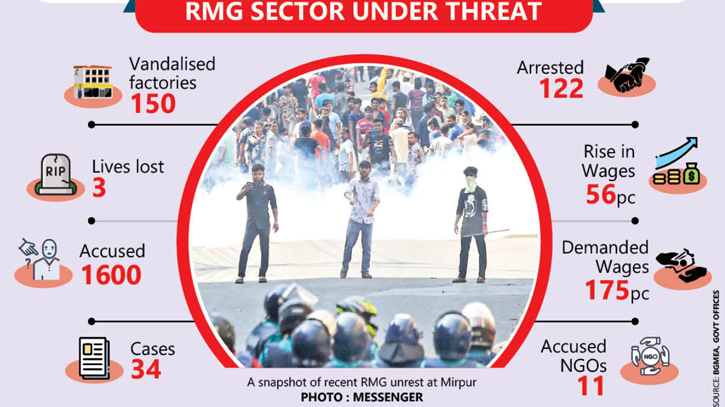
Photo : Messenger
Unrest has been prevalent in the country's garment industry for the past month, revolving around the determination of minimum wages for garment workers. Three workers were killed, and hundreds were injured in the clash between garment workers and the police. Additionally, approximately 1,600 people have been accused in 34 cases related to these sabotage incidents. Out of them, 122 people have been arrested.
However, garment owners allege that many of these saboteurs are not garment workers. The government made the same claim, which was substantiated after confirming the identity of the arrested individuals. These miscreants have incited workers to gain political advantage.
According to a government intelligence report, approximately a dozen NGOs in Gazipur, Savar, and Ashulia incited violence under the guise of working for workers' interests. Funds are said to come from some developed countries for these NGOs. Earlier, in 2010 too, there were allegations of involvement of several NGOs in creating unrest in the garment industry.
According to the source, initial evidence of the involvement of some NGO officials in the recent violent incidents in Savar and Ashulia areas has been found. An inquiry is being made as to whether there is anyone else behind them. Legal action will be taken against those concerned if appropriate information is found.
In this regard, BGMEA President Faruque Hasan told the Daily Messenger, “There has been a stable and peaceful environment in the garment industry for the past 5 years. That's why we are receiving praise internationally. However, there are many who are not happy with our progress; they want to disrupt this peaceful situation in any way."
The BGMEA president mentioned that despite the increase in wages, factories were vandalised in various places in the name of agitation. In several factories, some unidentified agitated workers went on an illegal strike and beat up the officials. Extensive vandalism and destruction were carried out inside the factory.
“It is very sad that when we are struggling to survive under the twin pressures of 'global and financial', the industry is being subjected to various activities. Especially our peaceful labour groups are being incited by vested interests,” he added.
Meanwhile, aside from the violent movement in various areas, a self-interested group has initiated various online activities against the country's garment industry. Disinformation about the garment industry is spreading on social media, an act tantamount to treason. During the garment workers' agitation, rumours were spread that three people had died in the Epyllion factory, which was not true.
On October 26, terrorists vandalised the ABM Fashion Limited factory in the Konabari area of Gazipur, three hours after closing. They broke the main gate with hammers, entered inside, took the officials hostage, ran rampant for about two hours, and set fire to the factory. Imran, the factory's button operator, died from suffocation caused by the fire's smoke.
Recently, three garment workers, Anjuara Khatun, Rasel Howlader, and Md. Imran, were killed in the agitation for various demands, including a salary increase. Due to the situation, management authorities have decided to close approximately 130 garment factories in Ashulia, Kashimpur, Mirpur, and Konabari areas indefinitely. The owners of these factories have announced the closure mainly for the safety of the officials, employees, and workers and for the protection of the factory property.
When asked about this, Lovely Yasmin, Chairperson of Bangladesh Readymade Garments Workers Federation, said, “Garment workers are advocating for fair demands. We have demanded an increase in the wages of the workers according to the current rate of inflation. Our workers never want to resort to violence. They want to pursue their demands peacefully.”
“However, it is not possible for the workers to determine if someone engages in vandalism among thousands of workers. We can neither admit it nor deny it. Law enforcement can say it better,” she added.
Since 2013, the wages of workers have been regularly increased at a minimum rate of 5 percent every year, according to BGMEA sources. The central fund has been implemented from the financial year 2016-17, which is spent on various welfare programmes for the workers. Besides, gas prices have increased by 286.5 percent, and electricity prices have risen by 21.47 percent since 2018. In the last five years, the cost of production in the garment industry has increased by about 40 percent.
According to relevant sources, 6,885 garment factories have become members of BGMEA so far. Out of these, 3,964 member factories have closed for various reasons. The remaining 2,339 factories have renewed their membership in BGMEA. Additionally, 1,600 member factories are operating by directly taking orders from buyers.
Moreover, the country's garment industry is encountering new challenges due to the global political situation. In the first 9 months of 2023, the US global apparel import value decreased by 22.81 percent, while their imports from Bangladesh decreased by about 23.33 percent. During the same period, imports from the rest of the world decreased by 25.16 percent, whereas imports from Bangladesh decreased by 29.37 percent. In August, the value from Bangladesh decreased by 33.71 percent, and in September, it declined by 34.72 percent.
On the other hand, in the first 8 months of 2023, global imports to Europe decreased by 9.61 percent, and imports from Bangladesh decreased by 13.71 percent. In August alone, imports from Bangladesh to Europe decreased by 26.06 percent.
In October 2023, the country's overall exports declined by 13.64 percent compared to the same period the previous year, and the actual export performance fell 28.35 percent below the strategic target for apparel exports in October 2023.
Messenger/Disha








